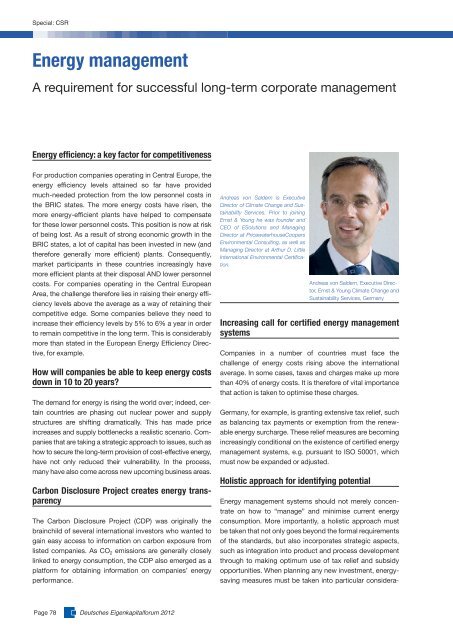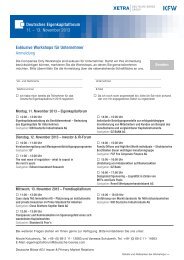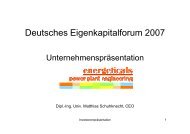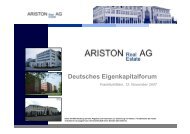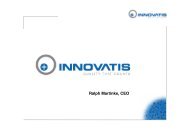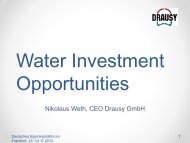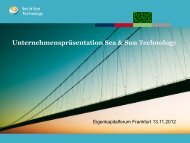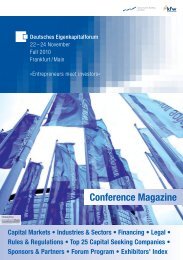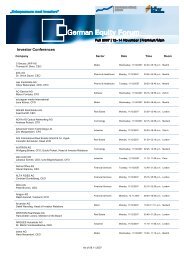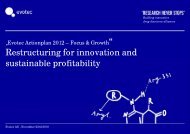Conference Magazine - GoingPublic.de - Deutsches Eigenkapitalforum
Conference Magazine - GoingPublic.de - Deutsches Eigenkapitalforum
Conference Magazine - GoingPublic.de - Deutsches Eigenkapitalforum
You also want an ePaper? Increase the reach of your titles
YUMPU automatically turns print PDFs into web optimized ePapers that Google loves.
Special: CSR<br />
Energy management<br />
A requirement for successful long-term corporate management<br />
Energy efficiency: a key factor for competitiveness<br />
For production companies operating in Central Europe, the<br />
energy efficiency levels attained so far have provi<strong>de</strong>d<br />
much-nee<strong>de</strong>d protection from the low personnel costs in<br />
the BRIC states. The more energy costs have risen, the<br />
more energy-efficient plants have helped to compensate<br />
for these lower personnel costs. This position is now at risk<br />
of being lost. As a result of strong economic growth in the<br />
BRIC states, a lot of capital has been invested in new (and<br />
therefore generally more efficient) plants. Consequently,<br />
market participants in these countries increasingly have<br />
more efficient plants at their disposal AND lower personnel<br />
costs. For companies operating in the Central European<br />
Area, the challenge therefore lies in raising their energy efficiency<br />
levels above the average as a way of retaining their<br />
competitive edge. Some companies believe they need to<br />
increase their efficiency levels by 5% to 6% a year in or<strong>de</strong>r<br />
to remain competitive in the long term. This is consi<strong>de</strong>rably<br />
more than stated in the European Energy Efficiency Directive,<br />
for example.<br />
How will companies be able to keep energy costs<br />
down in 10 to 20 years?<br />
The <strong>de</strong>mand for energy is rising the world over; in<strong>de</strong>ed, certain<br />
countries are phasing out nuclear power and supply<br />
structures are shifting dramatically. This has ma<strong>de</strong> price<br />
increases and supply bottlenecks a realistic scenario. Companies<br />
that are taking a strategic approach to issues, such as<br />
how to secure the long-term provision of cost-effective energy,<br />
have not only reduced their vulnerability. In the process,<br />
many have also come across new upcoming business areas.<br />
Carbon Disclosure Project creates energy transparency<br />
The Carbon Disclosure Project (CDP) was originally the<br />
brainchild of several international investors who wanted to<br />
gain easy access to information on carbon exposure from<br />
listed companies. As CO 2 emissions are generally closely<br />
linked to energy consumption, the CDP also emerged as a<br />
platform for obtaining information on companies’ energy<br />
performance.<br />
Page 78 <strong>Deutsches</strong> <strong>Eigenkapitalforum</strong> 2012<br />
Andreas von Sal<strong>de</strong>rn is Executive<br />
Director of Climate Change and Sustainability<br />
Services. Prior to joining<br />
Ernst & Young he was foun<strong>de</strong>r and<br />
CEO of ESolutions and Managing<br />
Director at PricewaterhouseCoopers<br />
Environmental Consulting, as well as<br />
Managing Director at Arthur D. Little<br />
International Environmental Certification.<br />
Andreas von Sal<strong>de</strong>rn, Executive Director,<br />
Ernst & Young Climate Change and<br />
Sustainability Services, Germany<br />
Increasing call for certified energy management<br />
systems<br />
Companies in a number of countries must face the<br />
challenge of energy costs rising above the international<br />
average. In some cases, taxes and charges make up more<br />
than 40% of energy costs. It is therefore of vital importance<br />
that action is taken to optimise these charges.<br />
Germany, for example, is granting extensive tax relief, such<br />
as balancing tax payments or exemption from the renewable<br />
energy surcharge. These relief measures are becoming<br />
increasingly conditional on the existence of certified energy<br />
management systems, e.g. pursuant to ISO 50001, which<br />
must now be expan<strong>de</strong>d or adjusted.<br />
Holistic approach for i<strong>de</strong>ntifying potential<br />
Energy management systems should not merely concentrate<br />
on how to “manage” and minimise current energy<br />
consumption. More importantly, a holistic approach must<br />
be taken that not only goes beyond the formal requirements<br />
of the standards, but also incorporates strategic aspects,<br />
such as integration into product and process <strong>de</strong>velopment<br />
through to making optimum use of tax relief and subsidy<br />
opportunities. When planning any new investment, energysaving<br />
measures must be taken into particular consi<strong>de</strong>ra-


